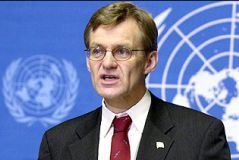Tensions force UN humanitarian chief to leave Darfur camp
May 8, 2006 (NYALA) — The U.N. humanitarian chief hurriedly left a Darfur camp for displaced people Monday when a crowd attacked one of his translators over an apparent mistake, a U.N. spokeswoman said.
 Jan Egeland and his entourage cut short their visit to Kalma camp, near Nyala in southern Darfur, when elements of a demonstration of 1,000 people manhandled a translator whose words they had misunderstood, spokeswoman Dawn Blalock said.
Jan Egeland and his entourage cut short their visit to Kalma camp, near Nyala in southern Darfur, when elements of a demonstration of 1,000 people manhandled a translator whose words they had misunderstood, spokeswoman Dawn Blalock said.
The translator wasn’t injured, but colleagues put him into a van for his own safety, Blalock said in a phone call to The AP. She declined to give details of the misunderstanding, but said the assailants suspected the translator hadn’t correctly translated their words.
The demonstrators then broke the windows of the van and another vehicle in Egeland’s convoy, which left the camp to return to Nyala.
“We did not evacuate,” Blalock stressed. “The program was cut short because tensions were too much.”
Egeland, the U.N. undersecretary-general for humanitarian affairs, had gone to Kalma to meet leaders of the camp’s at-least 90,000 inhabitants and representatives of the NGOs. Blalock said there had been tension in camp because of the absence of a camp co-ordinator.
He was met by demonstrators, mostly women, chanting: “Yes to international troops,” a reference to the Western proposal for U.N. peacekeepers to be deployed in Darfur.
Until the signing of a peace accord Friday, the Sudanese government had refused to see a big U.N. peacekeeping force take over from the relatively small African Union operation that is now operating in Darfur.
Many hold out hope U.N. peacekeepers can do more to stabilize Darfur than an AU force now in Darfur. Sudan’s government said Saturday the peace accord could open the way to a U.N. force, a step the government had previously resisted.
After his arrival in Darfur Sunday, Egeland warned the peace treaty – signed between the government and only one of three rebel factions – wouldn’t be easy to implement.
“We are now in the center of the war which is still going on,” Jan Egeland told AP Television News. “The world should have no illusions that peace will break out easily here in Darfur. We have to have an enormous effort from the international community and the parties themselves to enforce this peace agreement.”
Egeland spoke as he visited a camp for some of the 2 million people who have fled their homes during the three year rebellion and counterinsurgency. Another 180,000 have died, mainly from disease and hunger.
The U.N. says rebel-held areas near the camps Egeland visited Sunday had seen major attacks by pro-government militia that had forced 200,000 people to flee in the past three months.
Combatants appeared to be expecting a treaty to come out of the long-running negotiations in Nigeria and have been jockeying to hold the most territory before a ceasefire.
Egeland said Sunday that thousands of people had been displaced by fighting in recent days and there could be more fighting.
Aid workers have repeatedly complained the government has barred them from working, and fighting has made it impossible for them to help civilians. Egeland was barred by the Sudanese government from visiting Darfur and Sudan’s capital of Khartoum in April.
Decades of low-level tribal clashes over land and water in Darfur erupted into large-scale violence in early 2003 when members of the African ethnic tribes rose in revolt and demanded regional autonomy. The government is accused unleashing Arab militiamen who have been blamed for widespread killing, rape and destruction.
The government denies supporting the Arab militia.
(ST/AP)
